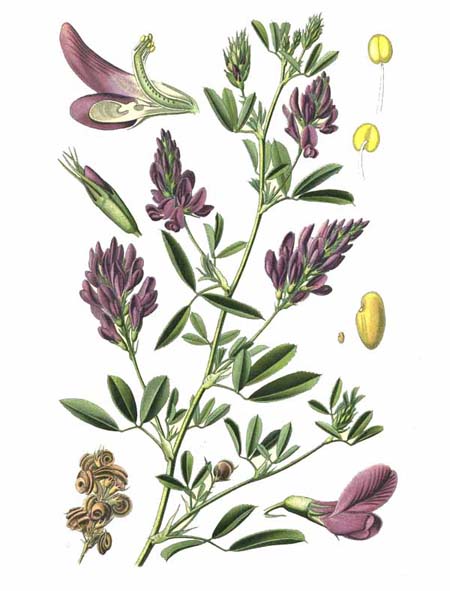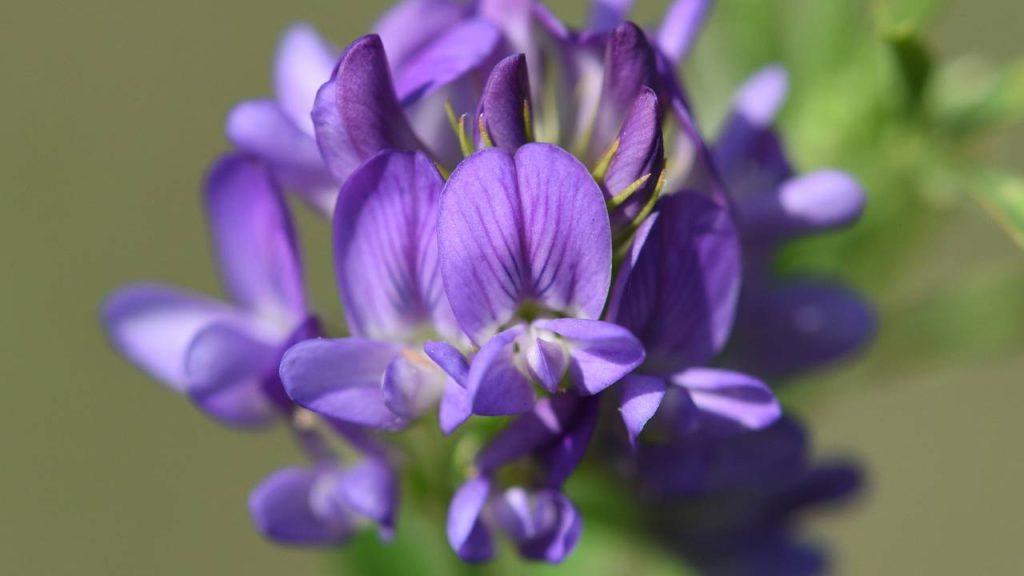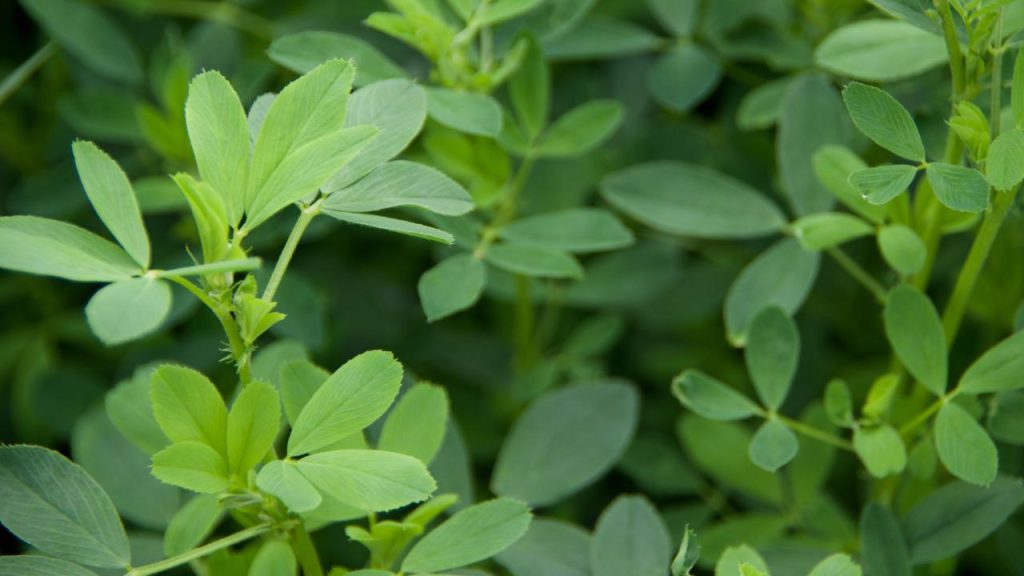The Alfalfa plant, (Medicago sativa L.), a perennial herb from the Fabaceae family, adorns an erect stem approximately 40 centimeters high. Its trifoliate leaves, often marked with white spots, and red flower heads, imbue it with a distinct allure. Notably, it features protective stipules at the base of the leaf and flower stalks. Each flower’s unique form resembles a funnel, exuding a honeyed aroma and a sweet-sour taste. Its fruit, a pod, is coiled much like a snail’s shell, concealing within 1-2 seeds.
Thriving in well-drained, fertile, and deep soils, lucerne often adorns meadows and pastures. It flourishes extensively, especially within Europe, Asia, and North America’s temperate zones. Harvesting for medicinal use primarily targets flowering Alfalfa, at the peak of its bloom. Depending on the climate and locale’s altitude, the typical harvest season falls in late spring or early summer.

Taxonomy
| Kingdom: | Plantae |
| Order: | Fabales |
| Family: | Fabaceae |
| Genus: | Medicago |
| Species: | Medicago sativa |
Other names: Lucerne,…
Blooming period
| I | II | III | IV | V | VI |
| VII | VIII | IX | X | XI | XII |
What Does Alfalfa Contain
Alfalfa is a veritable treasury of nutrients. This extraordinary plant is brimming with essential vitamins, encompassing vitamins A, C, B group, D, E, and K, and a variety of amino acids, proteins, and enzymes. In addition, lucerne is abundant in minerals such as potassium, calcium, iron, magnesium, and phosphorus, and it simultaneously harbors vital organic acids, fats, carbohydrates, saponifies, and essential oils, among other nourishing substances. To sum up, Lucerne is a natural multivitamin cocktail, that offers a plethora of health benefits.
When is Alfalfa Harvested
Alfalfa is harvested during its flowering period, from June to September, whether in its entirety (herb) or just its blossoms (Flores), and then it’s dried in the shade. To prepare salads or stews, the young plant is gathered before flowering, while the stem has yet to become woody.

Medicinal Properties of Alfalfa
Alfalfa is highly regarded for its multitude of medicinal properties. This plant is a natural multivitamin cocktail, enriched with essential vitamins, minerals, proteins, and various amino acids. In folk medicine, lucerne is utilized to alleviate symptoms of rheumatism and gout, as well as to bolster immunity. Moreover, Alfalfa can assist in maintaining skin health, often being employed in the preparation of compresses for treating ulcers or hardened glands.
Additionally, Alfalfa serves as a key ingredient in crafting various natural remedies, such as invigorating tea and luscious mead. These beverages can contribute to an overall healthier condition, aiding in body strengthening and disease prevention. Also, lucerne can support digestion, stimulate liver and gallbladder function, and aid recovery post-surgery. All in all, Alfalfa offers an impressive range of health benefits.
Alfalfa as a Remedy – Preparation, Application, and Effect
Alfalfa, modest in its greenery, offers extraordinary health benefits. It’s crucial to note that even the cooking process does not diminish its nutritional value. The vitamins within Alfalfa remain preserved even after 20 minutes of thermal treatment.
Lucerne in Combatting Rheumatism and Gout
Alfalfa, a natural ally against rheumatism and gout, offers fresh juice from young leaves. This juice, consumed at 40-70g daily, can help alleviate these conditions’ symptoms. Moreover, Alfalfa’s inherent safety for prolonged use makes it perfect for daily incorporation.
Alfalfa Mead – A Natural Tonic for Strengthening the Body
Among many products from Alfalfa, Lucerne mead stands out as a natural tonic for body strengthening. Its preparation involves boiling 250g of dried, young lucerne leaves in a liter of distilled water or rainwater. After cooling, the liquid is strained and mixed with 2kg of meadow honey. The recommended dose is 2-3 large spoons of this tonic three times daily after meals. This mead aids in body strengthening and disease prevention, granting it the status of a potent ally in health preservation.

Alfalfa Tea is an Excellent Beverage for Health
Alfalfa tea is a healthy beverage that is quite straightforward to prepare. Using two teaspoons of lucerne flower heads, pouring over 2.5 dl of boiling water, covering, and letting it steep for 10 minutes results in a refreshing and wholesome drink. This tea can be consumed 2-3 times daily, with or without the addition of honey. Moreover, it can be a tasty alternative to coffee or regular tea.
Lucerne does not just provide benefits for internal health, but it is also remarkably useful for skin care. Alfalfa tea can be used for rinsing the skin in cases of ulcers or wounds in the initial stage. Additionally, applying compresses from this tea can assist in alleviating symptoms of hardened glands, such as breast indurations. Alfalfa is also a friend of the liver. It stimulates the function of the liver and gallbladder, especially in instances of bile duct obstruction.
Alfalfa is an Ally in Postoperative Recovery
Finally, Alfalfa gains acknowledgment for its valuable role in postoperative recovery, especially after stomach-related surgeries. In such cases, when the patient is often weak, thin, and lacking appetite, Alfalfa can help in body strengthening and appetite stimulation. Due to all these reasons, Lucerne surely deserves a place in daily diets and health routines.
